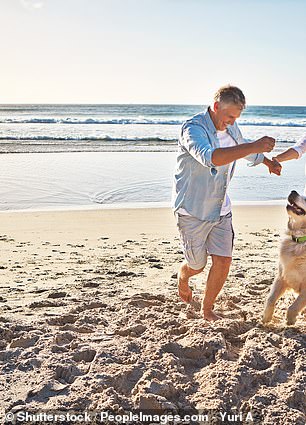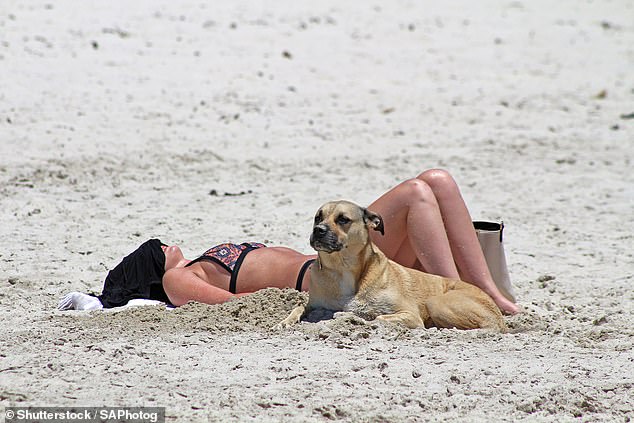I’m a vet – if you’re taking your dog to the beach this summer, you must be aware of these hidden dangers
With temperatures in the UK reaching 25 degrees, there’s no better way to enjoy summer than heading to the beach.
Whether you have plans at home or traveling this year, an expert warns of some seaside dangers that could harm your dog and even be fatal.
According to Gloucestershire vet Rebecca MacMillan and UK pet sitting platform TrustedHousesitters, discarded charcoal from the barbecue and drinking salt water are just some of the dangers that can prove fatal to your furry friend.
To help dog owners prepare for a safe trip to the coast this summer, experts have revealed six hidden beach hazards to watch out for, and named five dog-friendly beaches in the UK that guarantee “great memories.”
Angela Laws, Head of Community at TrustedHousesitters, adds: ‘While a day at the beach can be a fantastic adventure for both pets and their owners, it’s vital to put safety first.

Gloucestershire-based vet Dr Rebecca MacMillan and UK pet sitting platform TrustedHousesitters reveal six beach hazards that could harm your dog (Stock Photo)
‘By being aware of potential hazards and taking simple precautions, we can ensure that our furry friends enjoy the sea as much as we do. Remember, a little preparation goes a long way in creating wonderful memories for the whole family – two-legged and four-legged.’
In this article, we reveal six hidden dangers lurking on the beach and how to protect your pet from them, according to our expert.
1. Open holes
According to Rebecca, it is not only the content of the sand that poses a danger, but also the sand itself, as beaches often have large holes.
She explained: ‘Large holes dug in the sand can be a major tripping hazard for dogs running or chasing toys on the beach. Your dog may not be expecting a hole because he is running at high speed and could fall and injure himself.’
If you or your dog decide to dig a hole in the sand, the expert warns to be mindful of other beach animals and fill the hole back up before you leave.
2. Sand and salt water consumption
A beautiful day and a blazing sun are the perfect combination to make your dog thirsty and dehydrated.
If your pet is near a large body of water, he may enjoy a sip of seawater. But according to the expert, this seemingly innocent act can lead to disaster.
She added: ‘When a dog ingests salt water, it can disrupt the electrolyte balance in the body and cause dehydration. Impaction is also another risk for dogs who habitually ingest sand.
‘Too much sand in your pet’s digestive tract can cause a painful blockage, which may require surgery.’
3. Be wary of marine life
From jellyfish to biting ants, there are all sorts of dangers to be found on the beach, so always keep an eye on your dog.
“Jellyfish stings can occur both in water and on land, especially if your pet is curious,” the doctor said.
‘Stings can range in severity from mild irritation to anaphylactic reactions. If you think your dog has been stung, seek veterinary attention as soon as possible.’
4. Strong currents and waves
Even the most talented dog paddlers can find themselves in deep water if they encounter strong currents, Rebecca says.
“Consider your dog’s swimming ability. If your pet is old, young or debilitated, it is not wise to let them swim out of their depth,” she added.

Rebecca said there may be broken glass or sharp objects hidden beneath the sand surface and advised keeping an eye on your dog at all times (Stock Photo)
The expert emphasizes how important it is to keep an eye on your dog at all times during your stay at the beach.
5. Heat stroke
Heatstroke occurs when the body temperature rises above the normal 36 to 37.5 degrees Celsius and even reaches 40 degrees Celsius. However, the outside temperature does not have to be that high for this to occur.
Experts advise to be careful when the thermometer reads 25°C, and to be extremely careful when the temperature is above 27°C.
The doctor warned: ‘Some breeds are much more susceptible to heatstroke, including brachycephalic or flat-faced breeds such as pugs and bulldogs, and large or giant breeds with thick coats.
‘Take precautions with pets in extreme heat, make sure they are hydrated and adjust walking times to avoid the hottest temperatures. Remember that beaches have no shade, so while the sun may be welcome for us, our furry friends are at risk of getting their paws burned and overheating.’
6. Unsupervised digging
While your four-legged friend may be up for a bit of innocent digging on the shore, unguided searches can uncover hidden dangers.
“Barbecues are often held on the beach during the summer months, so make sure your pet doesn’t rummage through other people’s leftovers or rubbish,” the expert warned.
Although people should handle hot coals responsibly, there are frequent stories of people and animals burning themselves on discarded glowing charcoal from the barbecue.
“There may also be broken glass or sharp objects hidden beneath the sand surface. If your dog likes to dig, make sure you are nearby in case you make any unexpected discoveries.”
